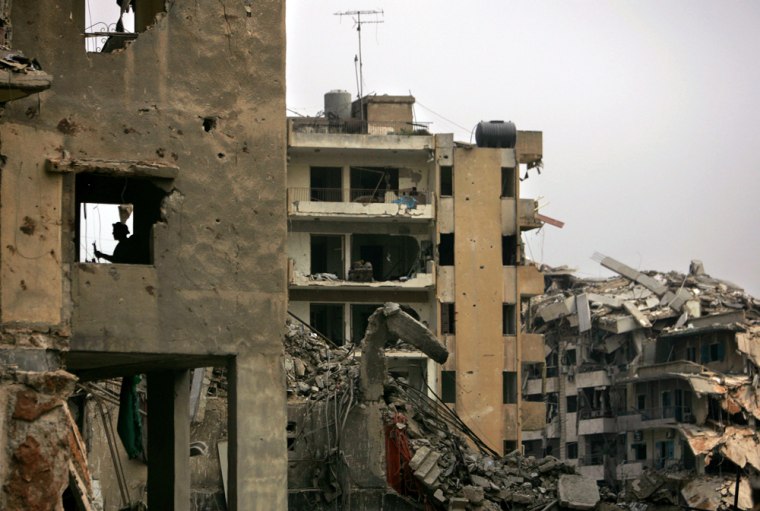Prime Minister Ehud Olmert said Tuesday that Israel will lift its air and sea blockade of Lebanon once an international peacekeeping force is deployed along Lebanon’s borders.
The remarks came during talks with U.N. envoy Terje Roed-Larsen and hours after the Lebanese foreign minister called on the international community to force Israel to end the blockade.
“Olmert said deploying the force at border crossings to Syria and at the airport will allow the lifting of Israel’s sea and air blockade and contribute to the implementation” of the U.N.-brokered cease-fire agreement, said a statement issued by Olmert’s office.
Previously, the Israelis have said they would continue to enforce the blockade as a way of preventing the rearming of Hezbollah, which is backed by Iran and Syria.
But with European nations reluctant to commit soldiers for a 15,000-member force, it is unclear when it will mobilize. In the meantime, Lebanon’s government has promised to take measures to improve security screening at Beirut’s airport and has deployed troops on the border with Syria.
Labor Minister Tarrad Hamadeh, one of two Hezbollah members in the Lebanese Cabinet, said that when Lebanon completes those measures, the Cabinet could decide “on its own to open its areas and rid itself of the siege.”
He said the government may try to break the blockade by calling on ships and aircraft to travel to Lebanese ports without prior Israeli approval.
“Entry to Lebanon by sea and from air is a matter of sovereignty,” Hamadeh said on Hezbollah television. He said the Lebanese “must be free to enter their country at will. We cannot accept the siege and blackmail.”
Truce fragile
The cease-fire that ended the war has proven to be as fragile as its detractors forecast, with European nations balking at sending large numbers of peacekeepers, and Israel objecting to the inclusion of troops from nations that don’t recognize it.
European Union officials in Brussels will meet Wednesday to discuss troop contributions; EU foreign ministers and U.N. Secretary-General Kofi Annan will meet there Friday. Roed-Larsen told Olmert that Annan will visit the Mideast next week.
Roed-Larsen told The Associated Press that there are “huge vulnerabilities in Lebanon” for the next two to three months, and he urged the rapid deployment of the foreign forces to prevent the collapse of the cease-fire.
“Until the Lebanese force is completely deployed and has asserted its full authority and until there is a robust peacekeeping force there and the necessary cooperation is established, there will be up to a point a security vacuum,” he said.
Israel imposed a sea, land and air blockade of Lebanon shortly after its offensive against Hezbollah began July 12. Israeli warplanes have attacked seaports and intercepted ships during the war, allowing the arrival of only those that apply for and are granted permission.
Jets also have struck major highways and Lebanon’s land routes to Syria, as well as runways at Beirut’s international airport.
Since the cease-fire took hold Aug. 14, the only land routes in and out of the country — to Syria — have reopened after temporary repairs. Commercial flights to Beirut have been allowed only to and from Amman, Jordan, an Arab state with a peace treaty with Israel.
Aside from the blockade, Israel has clashed with Hezbollah several times since the truce was declared, claiming it was acting in self-defense. Israeli aircraft also have flown over Lebanon.
Italy, which had signaled willingness to take on a major role in the peacekeeping mission, threatened Tuesday to withhold troops if Israel doesn’t respect the cease-fire.
Report: Peacekeepers can open fire
A French newspaper reported that U.N. peacekeepers in Lebanon likely will have the right to open fire to defend themselves and to protect civilians, but will be barred from actively searching for Hezbollah weapons.
Le Monde said it had obtained a copy of a document laying out the provisional rules of engagement for the force, newly strengthened under a U.N. Security Council resolution. The document, not yet approved, was stamped “U.N. Restricted,” the newspaper said. The Foreign Ministry did not immediately respond to calls seeking confirmation.
Three predominantly Muslim nations — Indonesia, Malaysia and Bangladesh — have volunteered to send peacekeepers, and on Tuesday, Indonesia insisted on its right to participate in the mission, despite Israel’s objections.
The U.N. cease-fire resolution does not explicitly give Israel authority to block countries from joining the peacekeeping mission, but it does say the force should coordinate with the governments of Lebanon and Israel.
Palestinian speaker charged
Meanwhile, Palestinian parliament speaker Abdel Aziz Duaik was led in shackles into an Israeli military court and charged with membership in an outlawed organization — becoming the most senior of three dozen top Hamas officials rounded up by Israel to be indicted so far.
Duaik said he does not recognize the court’s authority, adding: “I am an elected official.” Israel has arrested 30 Hamas lawmakers and five Cabinet ministers, including Deputy Prime Minister Nasser Shaer, in recent weeks.
Israel’s Defense Ministry suspended a review of the military’s performance during the war until the government decides whether to order a broader inquiry, officials said.
Olmert is under growing public pressure to approve an independent investigation with the power to dismiss top officials. Some reserve soldiers and bereaved parents already have demanded that Olmert and other wartime leaders step down.
